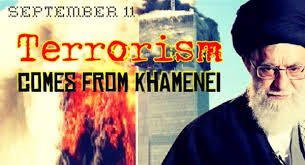April 2011
As you may have seen in the news in early March 2016 a New York
criminal court judge cited obvious evidence accusing Iranian Supreme Leader Ali
Khamenei as second in line after former al-Qaeda leader Osama bin Laden in the
September 11th terrorist attacks. This gained media attention and
political analysts across the globe. However, the question is what developments
have brought Khamenei’s role in the 9/11 attacks forward to center stage once
again?
We may be able to name different elements in this regard. However, in
general two main elements have led to such an issue being raised. The first
elements is Iran’s role in the international and regional balance of power,
which can be named as a fundamental issue. The signing of the nuclear agreement
(JCPOA) and developments in the region including Syria, Yemen and Iraq, and the
setbacks Iran suffered in the parliamentary and Assembly of Experts, have all
tipped the regime’s own balance and weakened the entire establishment. The
second element is the fact that we are in the U.S. elections year.
Logically when looking at the scene and international balance of
power, Iran is in an extremely weak position and is forced to give in before
international parties. When the parties involved witness this weakness they
obviously take the next step. Prior to the signing of the nuclear agreement
even Khamenei himself had said time and again, “Any retreat from the nuclear
program will have a chain reaction of retreats.” He repeated these remarks in
his speech on March 20th in Mashhad.
A question coming to mind is was the U.S. completely unaware of this
and is this a new discovery? If not, then why has it waited all these years and
only now published documents of Iran cooperating with al-Qaeda?
The answer was provided by the media citing a senior U.S. judiciary
official saying the U.S. government has been fully informed about the
relationship between Iran and al-Qaeda, before and after 9/11, and the most
important documents were those presented by National Security Agency.
Although, why hasn’t the U.S. unveiled these documents to this day is
a matter specifically related to the U.S. government’s policy of appeasement,
because it is obvious that if it had made clear the regime’s relationship with
al-Qaeda and the 9/11 attacks, and accused Khamenei himself as a suspect after
bin Laden, there would no longer be any negotiations with Iran or letters
between Obama and Khamenei. In fact, the U.S. government sought to never close
the path for negotiations. In this regard one of the witnesses, a former CIA
anti-terrorism agent involved, told the media the U.S. government was skeptical
about revealing how the Iranian regime’s was involved in the 9/11 attacks.
What is important in this regard is the
consequences Iran is facing after these accusations. The remarks made by the
CIA witness makes it very clear. Washington saying Khamenei was involved in
9/11 would mean war with Iran, he explained. Of course, it is not a military
war that we are talking about here. This can be described as intensifying the
political war and closing all paths before the regime in the region, its human
rights violations, terrorism and other issues.
Therefore, the path of negotiations and
appeasement vis-à-vis Iran would have become much harder and a very much
narrower path. This judicial order brings requirements for the U.S. government
and its official organs. These institutions are not permitted to easily deal
with Iran, being accused of having a role in 9/11. These reservations are not
only very serious in the U.S. elections year, but also the candidate that wins
the elections and be elected as president,
regardless of what party they belong to, will no longer be able to
appease the mullahs as Obama had done.

No comments:
Post a Comment